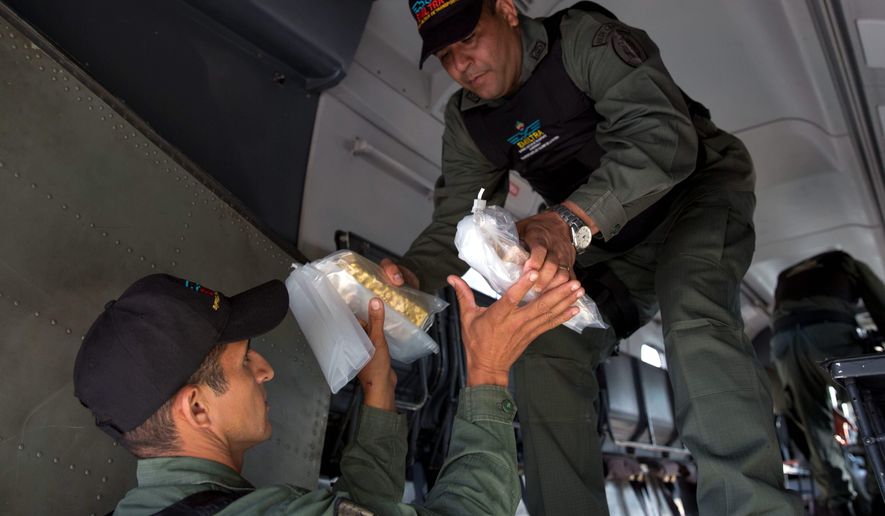Socialist Venezuelan President Nicolas Maduro loves his country’s gold so much that he has waved bars of it around during rallies.
The Trump administration has taken notice and has tightened sanctions that effectively seal almost 16 tons of Venezuelan gold held by the Bank of England.
Although oil is seen as his government’s lifeline, Venezuela’s gold deposits are playing an unexpected role in helping Mr. Maduro cope with a cash crisis at a moment when U.S. sanctions have essentially blocked Caracas’ ability to borrow funds from international markets.
“As oil production has fallen, the government has become increasingly reliant on gold for quick cash,” said Geoff Ramsey, a Venezuela analyst at the Washington Office on Latin America.
The catch, Mr. Ramsey said in an interview, is that “some of that gold has been mined in very questionable circumstances,” relying on elaborate international money laundering schemes to turn the precious metal into cash.
Mr. Maduro’s regime, meanwhile, belligerently presides over a collapsing economy and engages in political repression. That combination has triggered a mounting refugee crisis that is threatening to destabilize the South American country’s neighbors.
President Trump moved this month to increase pressure on Caracas by signing an executive order sanctioning Venezuelan gold exports and banning U.S. citizens from dealing with anyone involved in “corrupt or deceptive” Venezuelan gold sales.
“The Maduro regime has used this [gold] sector as a bastion to finance illicit activities, to fill its coffers and to support criminal groups,” National Security Advisor John R. Bolton said in a Nov. 1 policy speech in Miami.
Mr. Bolton said Venezuela was among a “Troika of Tyranny” with Cuba and Nicaragua. He said those nations collectively threaten U.S. interests in the Western Hemisphere in a way that justifies “direct action” by the administration “against all three regimes.”
South America observers say the urgency to thwart Venezuela’s gold exports is driven from within the Treasury Department’s office combating illicit finance.
Marshall Billingslea, Treasury’s assistant secretary for terrorist financing, has drawn specific attention to the dangers of the Maduro government’s dealings in gold and accused the Venezuelan president of looting his country.
“This gold is being removed from the country without any of the customary safeguards that would ensure the funds are accounted for and properly cataloged as belonging to the Venezuelan people,” Mr. Billingslea told an audience late last month at the Brookings Institution.
The Venezuelan Embassy in Washington did not respond to a request for comment on the allegations that the Maduro government is illegally exploiting the nation’s gold.
The chaotic Orinoco
With the world’s second-highest gold reserves, Venezuela’s Orinoco Arc spans from Colombia to Guyana across almost 70,000 square miles of the Amazon River basin. Gold has been mined from its rust-colored mud for almost 150 years.
But after socialist President Hugo Chavez nationalized Venezuela’s gold industry in 2011, mismanagement ground mining to such a trickle that official gold production in 2016 was less than 1 ton, according to commodities researchers.
With the Venezuelan government’s revenue from oil exports simultaneously stung in recent years by low global prices, Mr. Maduro launched an ambitious plan to revitalize the gold mining industry by allowing the country’s armed forces wide-ranging security powers over mines, including collecting mining taxes.
His regime touted the move as an environmentally friendly economic development plan to mine the precious metals of the Orinoco. But analysts say the reality was vastly different. Mr. Maduro granted Venezuela’s powerful military a lucrative prize in return for support of his unpopular autocratic style of rule.
The results have been worse than anyone could have expected, analysts say, with massive environmental damage stemming from large-scale mining and merciless disputes between mafia clans and local gangs unfolding among the tragic backdrop of muddy pits and deadly hand-dug shafts.
But production has jumped to 8.5 tons last year with projections for 24 tons this year, said Venezuelan Mining Minister Victor Cano.
It’s a reality that has triggered concern among U.S. officials tracking the gold’s path to international markets.
“Much of the gold is laundered, cleaned and moved through Colombia or countries in the Caribbean,” Mr. Ramsey said at the Washington Office on Latin America.
“Venezuelan mining companies are also purchasing the gold, in murky conditions, with very few questions asked about where it comes from,” he said. “These are the companies most affected by the recent gold sanctions.”
Just give us the gold
As part of the Trump administration’s push to end Mr. Maduro’s authoritarian grip on Venezuela as quickly as possible, Mr. Billingslea has issued stern warnings that there will be consequences if Caracas is caught evading gold or other U.S. sanctions.
The assistant Treasury secretary accused the Maduro regime last month of illegally exporting more than 21 metric tons of gold without approval from Venezuela’s opposition-controlled National Assembly.
While analysts debate whether Washington’s sanctions and threats will bring down the regime anytime soon, there is little question about the impact on Venezuela’s stockpile of gold bars in the Bank of England.
For decades, the government in Caracas stored gold to back its central bank reserves in foreign vaults. During Chavez’s reign from 1999 to 2013, the government repatriated more than 160 tons, but some gold stayed in the United Kingdom.
The Bank of England is sitting on some 16 tons of the gold, worth about $550 million, according to multiple reports, and Mr. Maduro is worried that it could be seized by U.S. authorities if it is shipped anywhere.
Bank of England officials have declined to comment on the situation, but sources close to the matter have been quoted in the British press as saying the bank seeks to “clarify” what Mr. Maduro plans to do with the gold before shipping any of it to Caracas.
• Dan Boylan can be reached at dboylan@washingtontimes.com.




Please read our comment policy before commenting.